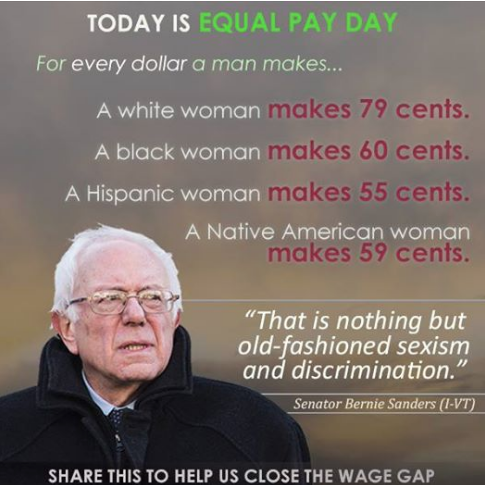A friend posted this on Facebook and one of her friends wondered about the figures.

I replied with this lengthy comment (edited to provide clarity), which is not meant to be controversial, but may induce controversy:
These are the gross numbers if you just take averages across populations. All of the econometric work I’ve seen suggests that if you adjust for race, education, work experience, and IQ the gap narrows to somewhere between 90 and 96 cents (this econometric work is conducted by both women and men.). That’s good new right? The gap is less than we traditionally believe and that means progress is greater than we traditionally believe, even if there is work left to be done. But when I see this pointed out in various articles, such as a Slate article I read a few months back, the response is, “there’s still a gap.” Well, yes the measured gap still exists (and for the sake of argument let’s assume things are measured correctly), but income differences are still substantially better than you thought. Can’t we celebrate progress and acknowledge ongoing challenges simultaneously? For whatever reason it seems the conversation has gotten so bad (vitriolic? woman-hating? epistemically biased?) that celebrating progress is seen by women as a threat that progress will cease rather than acknowledgment that strides are being made.
In some fields, especially medical fields, men are paid less than women even on average. Probably because women are better people than men, or at least have a reputation for being more empathetic, which lends itself to certain professions. (Some economists have suggested that women will be the beneficiaries of the coming automation revolution as people skills will become ever more scarce and valuable).
You might be tempted to say that men are genetically better positioned for “traditional” white collar jobs because of their aggressiveness and competitiveness, but at least some of this difference is socialized; when researchers have played competitiveness games in matriarchal societies women have scored significantly higher than the men. There is perhaps no easy solution to this problem. It’s unclear that women should be socialized for competitiveness simply so they can be better at traditional white collar employment, which emerged largely at the hands of white men. On the other hand, making the workplace less competitive — even if it is normatively the “correct” approach — is a difficult task. It seems to me competitive and cutthroat environments can be good for productivity and innovation even if they aren’t for everyone (man or woman).
Of course the perfect test of discrimination would be to compare the same people randomizing their sex, unfortunately (fortunately?) that isn’t possible. However, there have been studies where researchers have sent out the same resume with traditionally male and female names and men are more likely to receive an interview. Perhaps surprisingly this holds when women are the hiring manager so the discrimination is not always so easy to identify. The same penalty occurs with traditionally black names on resumes. To me this is much stronger evidence of discrimination than gross differences in pay.
The big thing that hurts women is childbirth. Women have a hard time fighting back and income gaps seem to persist for long after the children are born. And you can imagine that at least as traditional household matters break down, women that are the same age as their male counterparts tend to have less work experience after the age of, say 30 or 35, because they spend more time taking care of children. I would like to see the income argument shift from these raw numbers which I think oversimplify the problem and aren’t so useful at any rate, and toward more targeted discussion of specific policies related to helping women better “withstand” childbirth and its ongoing responsibilities career wise. Of course maternity leave gets talked about a lot, but we probably need to have a deeper, more robust conversation policy wise (and culturally) about how to help. A first step might be helping men to understand the tremendous monetary burden women endure when taking care of children. It is not simply that they forgo income for a year or two when the child is young and they stay home. On average that lost income never comes back. If childbirth accounts for 80% (or whatever) of the true income gap after sensible adjustments to education, experience, and aptitude, it seems a good place to start a policy and cultural conversation rather than pointing to a misleading figure about income differences; the latter is less actionable.
There are also probably other areas where gaps can be narrowed beginning even earlier, such as during education. Roland Fryer has done interesting work here. Even simple things like priming minority students before tests with encouraging words can help them perform better so there is possibly at least some low hanging fruit as grades often translate into opportunities later on. Of course there is lots of work in early childhood education. Differences in education, especially between whites and low-income minorities, certainly play some part in income differences later in life so closing the education gap could be beneficial.
At any rate I don’t think it’s correct to say that the current state of gendered income disparity is “old-fashioned sexism.” It may be new-fashioned sexism, but that probably requires a different conversation and response.